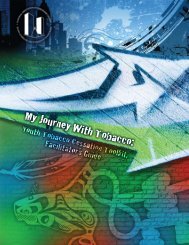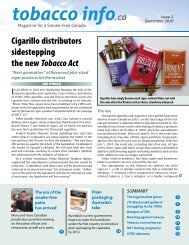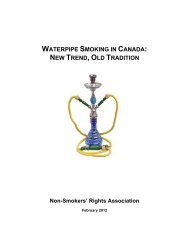Tobacco-Free Sports and Recreation Policies
Tobacco-Free Sports and Recreation Policies - New Brunswick Anti ...
Tobacco-Free Sports and Recreation Policies - New Brunswick Anti ...
You also want an ePaper? Increase the reach of your titles
YUMPU automatically turns print PDFs into web optimized ePapers that Google loves.
<strong>Tobacco</strong>-<strong>Free</strong> <strong>Sports</strong> <strong>and</strong> <strong>Recreation</strong> <strong>Policies</strong><br />
Awareness of TFSR Policy–Spectators<br />
When asked “Are you aware that this team has put in place a tobacco-free sports <strong>and</strong> recreation<br />
policy?” well over half (n=29, 58%) of the 50 surveyed Peewee/Bantam spectators indicated that<br />
they were aware. Those who were aware heard about the policy directly from their child or the<br />
team (n=6), another parent (n=4), the health unit representative (n=5), the coach (n=3),<br />
messaging (e.g., logo, announcement at a regular game) or attending a designated <strong>Tobacco</strong>-<strong>Free</strong><br />
game with TFSR promotion (n=9).<br />
TFSR Policy Awareness versus Messaging<br />
When the key informants <strong>and</strong> the focus group discussed awareness of TFSR policy, some<br />
participants appeared unsure of what a policy entailed <strong>and</strong> more often than not referred to a<br />
wide range of TFSR promotional initiatives that had been developed by local PHUs (or TCANs).<br />
One key informant made a key distinction between TFSR policy <strong>and</strong> TFSR messaging <strong>and</strong><br />
explained that the youth hockey players were more likely to reflect back on TFSR policy events<br />
rather than the policy document itself:<br />
I think for the kids they underst<strong>and</strong>, their awareness is the Play, Live Be<br />
messaging--that tobacco <strong>and</strong> sports don’t mix. I don’t think that they had a high<br />
level of awareness of what would happen if somebody was smoking or using<br />
tobacco <strong>and</strong> how that would impact the team so in terms of their awareness of the<br />
actual formality of the--specific policy--their awareness was low cause that wasn’t<br />
a focus. The focus of the policy was more the management <strong>and</strong> the parents <strong>and</strong> the<br />
coaches <strong>and</strong> the people who would be affected. The players it was more the<br />
education about the message <strong>and</strong> that was probably given their age as well cause<br />
they were younger. (PHU Key Informant)<br />
The PHU key informant also suggested that players know a policy document exists but that they<br />
may never be able to recite its contents. The message is clear to them <strong>and</strong> that is the most<br />
important aspect of the tobacco-free campaign. Focus group facilitators had to prompt the young<br />
players in both focus groups to recall the specific policy but many of the participants reported<br />
that they had received TFSR policy information from their parents:<br />
Ontario <strong>Tobacco</strong> Research Unit 17





